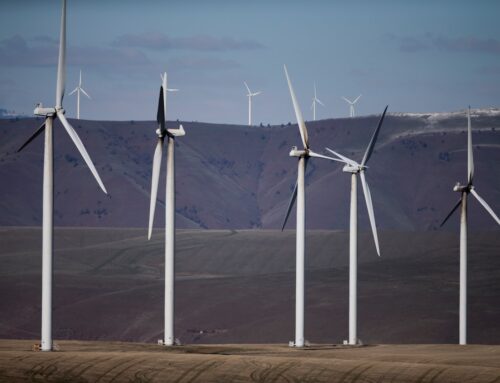Trump’s Attack on CA Environmental Law Brings Us Closer to Climate Catastrophe
June 29, 2025
Earlier this month, Donald Trump took his war against California and its web of environmental policies to a new extreme.
Around the same time as he was federalizing the California National Guard and preparing to deploy hundreds of marines into Los Angeles, at Trump’s behest, Congress was voting to overturn California’s state laws phasing out the sale of new gas-based passenger vehicles by 2035, mandating an increase in the percentage of nonfossil fuel-based trucks sold, and limiting nitrogen oxide emissions for heavy duty and off-road vehicles.
On June 12, Trump signed the resolutions into law, overturning the California mandates. This is despite the fact that the Senate parliamentarian — who is in charge of interpreting Senate rules — and the Government Accountability Office (GAO) had concluded that this was an illegitimate use of the Congressional Review Act (CRA) because California’s waiver was an order subject to the Administrative Procedure Act rather than simply an agency rule that the CRA could overturn. It’s technical stuff, but, basically, they were arguing that the CRA can only be applied to a very limited set of rules, which the Environmental Protection Agency (EPA) waiver fell outside of. In signing Congress’s resolutions despite the GAO and Senate parliamentarian’s concerns, Trump said he was rescuing the U.S. auto industry from destruction. In reality, by giving his stamp of approval to the political priorities of big oil, Trump was doing yet more damage to the global climate.
Trump, far and away the most anti-environment modern president, has long had California’s state-level environmental standards in his sights. That includes targeting the half-century-old EPA waivers which allow the Golden State to establish pollution and emissions standards for vehicles that go above and beyond the federal minimums. In the last years of the MAGA leader’s first administration, he pushed to roll back the waivers, resulting in a lengthy legal battle that was still unresolved when Joe Biden entered office, and his administration declined to defend the position of its predecessor.
Now, in version 2.0 of Trump’s presidency — with the entire federal government weaponized against climate research, mitigation efforts, and any policies that could move us away from fossil fuels and towards sustainable fuel alternatives — that campaign against California has accelerated. The gutting of the 2035 internal combustion engine phaseout effort is one part of this. The ongoing effort to eliminate the right of the state’s Air Resources Board to set its own tailpipe emissions standards is another. Meanwhile, on the federal level, these efforts include the attacks on universities and on climate science and the gutting of the National Oceanic and Atmospheric Administration and other federal agencies responsible for generating climate data. And this past week, the Supreme Court also put its thumb on the scales, ruling that a group of fuel producers could sue California over its vehicle emissions standards.
The implications of the move against California are stark: Because about a dozen other Democratic-led states follow California’s lead on emissions standards and electric vehicle (EV) mandates, it has a huge role in shaping U.S. markets. California’s bloc of states represents roughly 40 percent of the U.S. population — and since automakers are reluctant to have to hew to two separate markets within the country, they generally adhere to the highest common denominator when it comes to pollution standards. In other words, if California’s pollution and EV mandates stand, the country’s air gets cleaner and the shift away from fossil fuel reliance picks up steam, regardless of the priorities of the Trump administration. Moreover, this has an international magnifier effect, since many other countries also look to California when working out best practices for the shift away from fossil fuels. California helps make any kind of U.S. de facto adherence to Paris climate accord emissions reduction goals possible, even though Trump has, for the second time, withdrawn the country from the accord and prioritized the acceleration of fossil fuel production.
It’s that realization that is driving Trump’s animus here. He doesn’t just want to end federal climate change efforts; he wants to destroy the ability of states to chart their own course on the issue. After all, this is the man who, during the election campaign, promised to enact Big Oil’s every whim should the industry cough up $1 billion to pad his political war chest. Since that patently corrupt offer of a quid pro quo, he has repeatedly feted oil executives at Mar-a-Lago and in the White House, has ordered shuttered coal-based power plants to reopen, and has dismantled Biden-era tax subsidies for, and investments in, the development of an array of clean energy sources, from wind and solar farms to EV infrastructure.
If California’s EV mandate is shredded, the country will use billions more gallons of gas over the coming years than it would have otherwise. In 2022, the California Air Resources Board estimated that the shift away from oil-based fuels for California’s huge vehicle fleet would, by 2040, reduce CO2 emissions by 395 million tons, would result in 915 million fewer barrels of oil being used, and would result in thousands fewer deaths related to environmental pollution. Now, all that progress is being deliberately rolled back by the federal government, and for no good reason. It will, in consequence, be that much more difficult for the world to avoid passing critical tipping points in global warming. Yet in Trump’s calculus, that calamity is more than outweighed by the short-term financial benefits for the fossil fuel industry that will accrue as the pump is primed to increase demand for their products.
California is well aware of the stakes. Consider it a modern-day version of the automobile and gas industries’ purchase and destruction of public transit tram lines in Los Angeles generations ago — a wanton act of industrial vandalism that turned Los Angeles from a city with a viable and expanding public transport system into the private car capital of the universe. That helped set the U.S. on a century-long trajectory that, with the exception of a few cities, prioritized private vehicle usage over public transit.
In the aftermath of the congressional voiding of the state’s 2035 electric vehicle mandate, California Gov. Gavin Newsom issued an executive order asking state legislators and the Air Resources Board to come up with alternative ways to stimulate the growth of the EV market and to protect its emissions standards, and to prioritize state contracts with companies meeting EV targets.
At the same time, the state’s attorney general filed suit against Trump for an illegal use of the Congressional Review Act. The suit is being joined by 10 other states: Colorado, Delaware, Massachusetts, New Jersey, New Mexico, New York, Oregon, Rhode Island, Vermont, and Washington.
Because the mandate was overturned through the Congressional Review Act, however, it typically wouldn’t be subject to judicial review. This means that California’s lawsuit, which is largely based around the parliamentarian’s conclusions, is still something of a long shot.
Trump’s wrecking ball approach to environmental policy is continuing apace. Over the coming months, California and its blue state allies will need to work out a new strategy — one that moves beyond simply filing lawsuits — to get around the federal vise. If it can, then the blue parts of the United States might be able to maintain their environmental policies in the face of the MAGA onslaught and help reduce emissions for all of us; if it can’t, the climate crisis will pick up evermore steam.
Truthout
Search
RECENT PRESS RELEASES
Related Post




